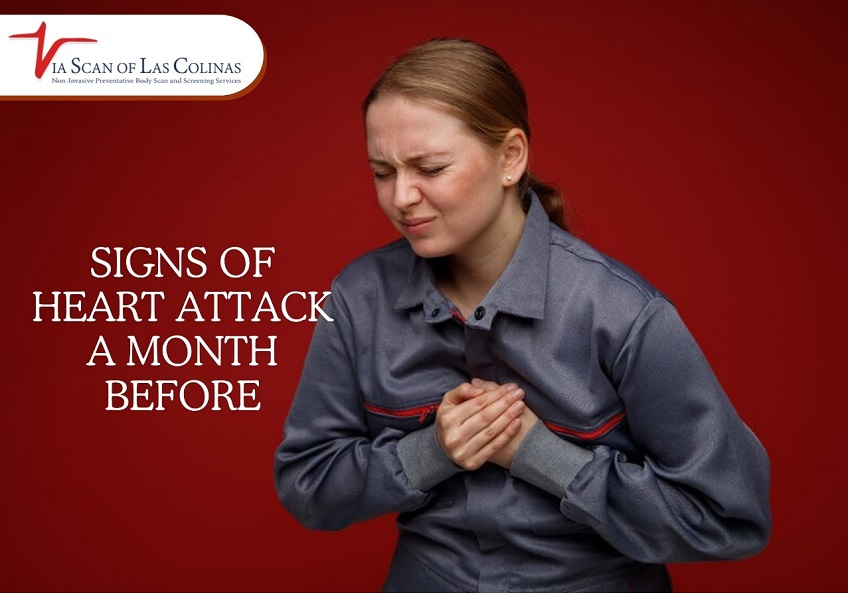In the United States, cardiovascular disease is the top reason for death for both men and women. Heart disease claims the lives of tens of thousands of Americans annually, or one in every four fatalities. It can save lives to recognize the early symptoms and indications that may appear in the days and weeks that follow before a heart attack. This post will discuss six indicators that could point to a heart attack as soon as next month.
February is Heart Month – Heart attacks are preventable – we don’t have a treatment problem. We have an identification problem – doctors rely on tests that guess or only discover heart disease at very advanced stages; secondly, people wait until it’s too late – as an unexpected heart attack in a seemingly healthy person is frequently the first & only symptom indicative of a heart problem!
ViaScan’s advanced technology and early identification capabilities, you can pave the way for a long and healthy life – a winning strategy for healthy longevity. What’s more, ViaScan offers the most affordable preventive scan package in North Texas, combining life-saving preventive heart and body scans for early cancer detection at just $695 – a price that has remained unchanged since 2001. With ViaScan’s commitment to low-cost, high-tech preventive health, you won’t find a better deal anywhere else. If you find an advertised heart and body scan for less than $695, ViaScan guarantees to match the price and further reduce it by an additional $100. Take advantage of ViaScan’s low-cost guarantee and prioritize your health today.
How Long Can You Have Symptoms Before a Heart Attack?
Signs before a heart attack can indeed start to show up weeks or even months in advance of a heart attack. A calcium test for heart or a heart scan for blockage remains the best option for getting an insight into your heart’s health. Discomfort or pain in the chest is the most prevalent early warning indicator. This could have an aching, burning, or constricted feeling. Instead of being steady, the pain could come and go. Anywhere in the chest can experience it, and occasionally, it spreads to the arms, neck region, jawline, or spine. Chest pain should be assessed by a physician immediately if it lasts more than five minutes or disappears for a while before returning.
Many other minor symptoms can appear weeks or months before a heart attack, such as tiredness, shivering, indigestion, loss of breath, and nausea. Observe any new or aggravated symptoms and talk to your doctor about them. If a cardiac event does happen, the sooner it is treated, the better.
How Long Does Your Body Warn You Before a Heart Attack?
According to experts, your system may give signs for days or even up to a month before a cardiac event actually occurs. The length and intensity of the initial symptoms, however, differ greatly between individuals. Days or weeks before a heart attack, certain individuals endure excruciating chest pressure and agony that brings them to the hospital for treatment. Some may only have minor symptoms, such as exhaustion or loss of breath, which they blame on other factors like aging or being overweight.
It’s critical to identify early warning indicators and not ignore them. It is important to assess prodromal heart attack symptoms as soon as possible, regardless of how sporadic or mild they are. Once a heart attack actually happens, calling 911 or receiving immediate medical assistance if symptoms last longer than five minutes may prevent death or irreversible heart damage. Your doctor should be informed of any new or worrisome symptoms so they can look for any latent heart problems.
How Long Can a Woman Have Symptoms Before a Heart Attack?
According to studies, women are more inclined than males to exhibit early warning indicators in the days, weeks, or months prior to suffering a heart attack. For women, the most typical symptoms include anxiety, dyspepsia, shortness of breath, unusual weariness, and sleep difficulties. uncommonly signs of a heart attack such back pain, jaw discomfort, or nausea without sensations of pressure in the chest are also more common in women.
Women may have signs of coronary artery disease weeks in advance due to more subdued symptoms. A lot of the time, warning indicators are written off as stress, aging, or other medical issues. Women are also more likely to put off getting medical attention, which can worsen heart problems. It’s critical that women do not minimize symptoms that linger or flare up occasionally. Seek assistance if something seems strange.
What Happens Before a Heart Attack?
Deposits of fatty substances or calcium called plaque can burst within the blood vessels surrounding the heart in the few days preceding a heart attack. The resulting blood clot obstructs the cardiovascular muscle’s blood supply. The heart becomes damaged and weaker due to the limited blood supply. However, before a full-blown heart attack, the heart may convey warning signals about this occurring.
A heart attack could occur as follows:
- Especially when exerting oneself, chest pain, pressure, tightness, hurting, or burning
- Breathing problems and shortness of breath, particularly while active
- arm, back, neck, or jaw pain that radiates.
- light-headedness and nausea
- exhaustion, lassitude, and dizziness
- irregular pulse or palpitations in the heart
- Sweating and clamminess are symptoms similar to the flu.
- Stress or sleeplessness.
Even if these symptoms seem minor, get medical attention immediately if any of them appear. It is advised to call the Emergency number if symptoms last longer than five minutes. Treating warning symptoms promptly can stop a heart attack or significantly lessen cardiac damage with a heart attack screening.
Choose Our Preventive Heart Scan
Early Detection Saves Lives!
-
- Accurate
- Quick Result
- Affordable

Conclusion
Knowing the warning signals of a heart attack weeks or even months in advance may save your life. The most typical symptoms of a blockage denying the heart oxygen are chest tightness and pain, but other symptoms include nausea, sweat, exhaustion, and shortness of breath. Women are more likely than males to notice early warning indicators. If a worrying symptom persists for over five minutes, immediately dial the emergency number immediately. Talk to your doctor about screening methods and risk factors. Early detection of symptoms allows doctors to reduce heart damage or stop heart attacks with drugs or other treatments. It is essential to pay attention to your body’s indicators as it can prevent you from joining the alarming statistics of coronary artery disease.
ViaScan provides heart scans for blockage detection and sophisticated cardiac screening testing. Plaque accumulation can be found with our coronary calcium scan and calcium test for heart disease before it bursts and results in a heart attack. Heart attack prevention and screening services from ViaScan are cutting-edge and offer vital information to prevent heart attacks before they happen. To learn more about our cardiac screening test alternatives and how we can assist you in taking charge of your heart health, contact us.


